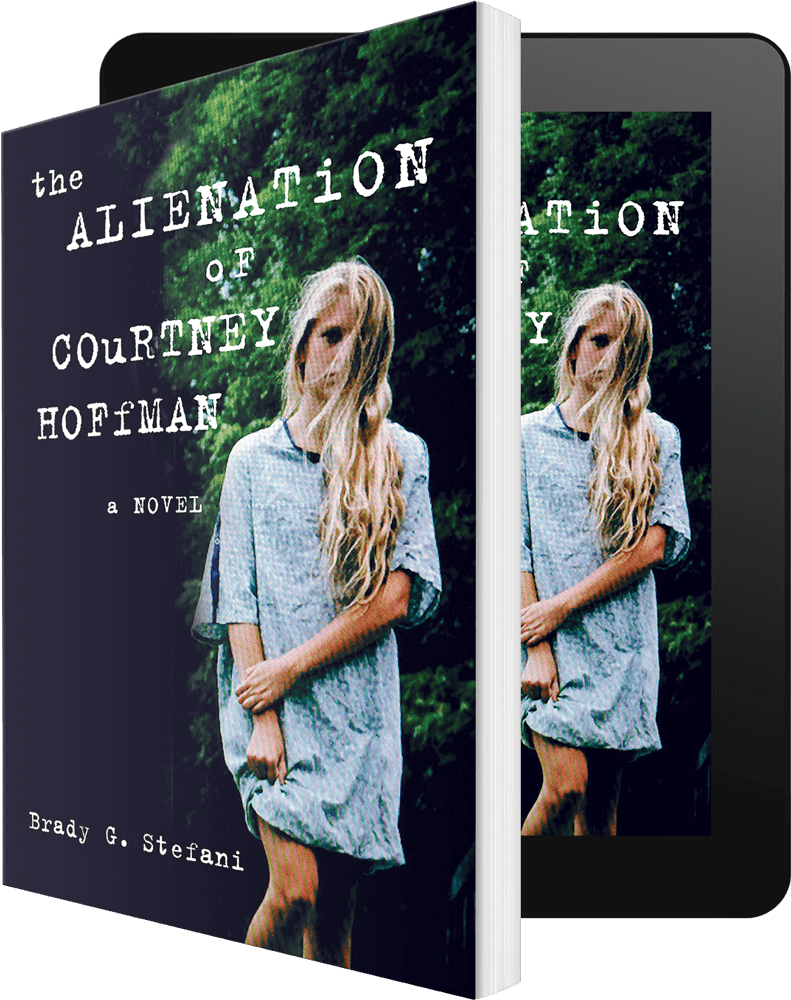
Verushka @ Pop.Edit.Lit
Q&A with Brady Stefani on the Alienation of Courtney Hoffman
When a book gets under my skin like The Alienation of Courtney Hoffman (reviewed here), I have no patience. So much so, that I sent Brady Stefani two questions about his book even before I had started reading. The cover and the promise of aliens in a coming-of-age story grabbed me and wouldn’t let me go.
Read on to see his answers!
It’s the cover that I can’t get out of my mind: on first glance, it looks like a striking coming-of-age story, but once I read the blurb, the cover was almost jarring. As you can see, it did a bit of a number on my perceptions of the book! I was wondering then what your thoughts were on cover and how it related to Courtney’s story.
Interesting question. One of the problems my publisher and I were and are up against with this book is how to accurately market it. How to find a readership. In one sense, the book is very much a young adult coming-of-age problem novel. The problem being Courtney’s struggle to make sense out of her traumatic past involving her conspiracy-obsessed grandfather, as well as the unexplainable nightmarish visions she’s beginning to suffer. Is she going crazy or isn’t she? Who can she turn to for help? In this sense it’s not much different than John Green’s Looking for Alaska, or Jennifer Niven’s All the Bright Places.
Where this book diverts from Alaska or Bright Places is that Courtney’s mental issues are not quite what they seem to be. She’s experiencing waking nightmares and unwelcome visits from alien creatures who claim to have shared an alliance with her now dead grandfather (the same grandfather who left her with her with a mysterious tattoo as a child). Courtney begins to believe these same aliens are now trying to recruit her for a mission, to protect the knowledge of an ancient human-alien bloodline. While Courtney’s adventure to uncover the truth about herself and her past take place in modern day California, the alien elements — whether real or imaginary (while it’s all clear by the end of the book, I’m not giving anything away here) — take the book sharply into the realm of science fiction.
The most honest way for me to describe the book is to call it a coming-of-age story, dealing with the stigma of mental illness, which has strong elements of science fiction. Given this unusual mixture of genres, we chose for our cover a photo of a lost, dazed teenager (dressed in a hospital gown no less). It’s meant to reflect her alienation and disconnect, and if you look at the cover closely, the photo is computer-griddish like something from The Terminator. So we thought this would represent the sci-fi element of the book.
As for finding an audience, I strongly believe the story is grounded enough in reality to appeal to Rainbow Rowell, John Green and Jennifer Niven readers. And while the book is not completely other-worldly or futuristic sci-fi, the concepts of the alien universe and human-alien ancestral bloodline are well thought out and quite unique. Given this, I think the book would definitely appeal to fans of science fiction, and definitely fans of the The X-Files.
The X-Files? CHECK.
For the second question, aliens. Aliens? What did they offer Brady as a writer to tell Courtney’s story? How does that work with a coming-of-age story? Well, this is how:
Because the novel deals with the stigma of mental illness, and the self-blame and social alienation that can go along with issues of mental health, it was very important for me to set the story in the real world, populated mainly with ordinary people. Courtney, the protagonist, is the perceivably normal, teenage, girl-next-door who struggles with typical adolescent-type family, friend and boy problems. She just wants to be normal, to fit in. Inopportunely, though, Courtney’s mind works a little differently than everyone else’s does — at times, frighteningly different. And as a result of this, people begin to think she is crazy, and she begins to believe them.
Having struggled with bouts of severe anxiety most of my life, and bounced from one doctor to the next unsuccessfully, I wasn’t comfortable with telling the story of a girl who learns to accept help, and then as a result comes to grips with past trauma while on the therapist’s couch, or learns cognitive exercises to cope with her anxiety, or finds a combo of psych meds to allows her to keep her emotional demons at bay. (Not that any of these wouldn’t be welcomed and acceptable solutions to someone’s sufferings)
But I wanted Courtney’s demons to be real. And I wanted them to be so extraordinarily unbelievable that everyone but a select few people who operate on the fringe of society would think she is completely delusional. Seriously, just imagine a 15-year-old girl trying to convince her friends, or her family or teachers or doctors, that she is being visited in bedroom at night by alien creatures who claim to have shared an alliance with her now dead grandfather, and are now out to recruit her for a mission. She’d quickly go from alienated to ostracized or worst.
So, what the aliens allowed me to do as writer was to close down Courtney’s options for help, and at the same time, force her to consider that the impossible may be happening to her. The aliens themselves give a voice to Courtney’s unconscious mind and her buried memories and truths. That the aliens, their hidden universe, their wormholes and channels of communications with alien-DNA-carrying humans could be real presents an alternative reality that is far more thought-provoking, liberating, and electrifying than the notion that if we can’t see it, it doesn’t exist, and the idea that we need to fix that which is not normal and protect ourselves the un-pleasantries of life as a human being.
That’s it! What do you think of Brady Stefani and The Alienation of Courtney Hoffman?
QnA with Brady Stefani on The Alienation of Courtney Hoffman


Leave A Comment